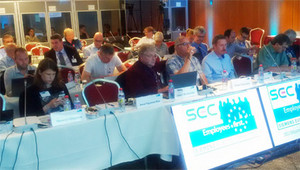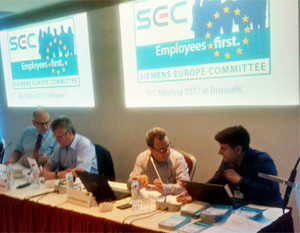https://www.dialog-igmetall.de/international/annual-meeting-of-the-siemens-europe-committee
25.04.2024, 08:04 Uhr
Annual meeting of the Siemens Europe Committee
- 07.06.2017
- International
Employee representations from all over Europe come together in times of change: On May 30th/31st 2017, 36 representatives from 22 European countries met in Brussels.
The dominating issue of the meeting were the numerous changes at Siemens that are going on. These concern, for example, the Healthcare division, which has been outcarved as a company of its own under the name “Healthineers”, and the Wind Power and Renewable Energies division, which has been merged with the Spanish company Gamesa and which will be directed from Bilbao in the Basque region of Spain. There are also plans concerning the software business of Siemens and ongoing speculations about the division Mobility.
Harald Kern, the chairman of the Siemens Europe Committee, pointed out, that many of these changes endanger the influence of the employee representation in the company and on the management´s decisions, for example, because more and more parts of Siemens will be directed from countries, where there is no participation of the employees and their representations in the company. Consequently, the management´s decisions will probably be more driven by the financial markets and will be more shortsighted resp. merely based on profit maximization.
The Siemens Europe Committee has granted a guest mandate for a second representative from Spain, because of the acquisition of Gamesa. This mandate is taken by Jesús Fagundez Diaz from Gamesa. Additionally, the Siemens Europe Committee is demanding a project group of the Siemens Europe Committee to accompany the integration of Gamesa. This group should consist of representatives of the concerned locations.
Yvan Bove, the representative from Belgium, gave some information about the employee representation at Siemens in Belgium. 10 union representatives from three unions (LBC, CNE and BBTK) represent about 1 500 employees. There is also a Works Council consisting of 8 members from the employer´s and the employee representation´s side.
Birgit Steinborn, the chairwoman of the Works Council of Siemens Germany, emphasized the importance of the European Union as guarantee for peace in Europe. Especially companies like Siemens depend on open borders. She described the situation at Siemens in Germany. There are job cuts in spite of the record high price of Siemens stocks and a huge profitability of the company. These job cuts concern the divisions PG, PD, DF, Mobility and the Siemens IT.
There are also plans to reduce the apprentice programs in Germany. This is absolutely contradicting the public presentation of the German apprentice system as success factor and even export article.
The employee representatives in Germany see Siemens on the way to be turned into a holding, which endangers the future of the company as an integrated technology company, where the different business sectors support each other.
Robert Kensbock, representative from Germany in the Siemens Europe Committee and deputy chairman of the Works Council of Siemens Germany, presented the shareholder association “Wir für Siemens”. The idea of this association is to bundle the votes of the employees of Siemens as shareholders and to take influence on the company´s decisions.
Roy Lund, Fritz Hagl and Ferran Navarro gave the reports from the meetings of the members of the Siemens Europe Committee in their respective regions.
Christian Schaller from Austria was elected unanimously as deputy chairman of the Siemens Europe Committee and as speaker of the region Central-/East-Europe. This election became necessary, because Fritz Hagl will soon retire.
Reinhard Hahn gave a statement on behalf of IG Metall. He emphasized the importance of the European Works Councils in these troubled times, especially in defending the specific European model of democracy and integration of the employees and their unions in the economy.
Harald Kern gave a short overview of the activities of forming a global union network at Siemens. He informed especially about the cooperation with the US unions and with the union committee of Siemens China.
Dirk Bergrath from the IG Metall office in Brussels gave some information about the role and the work of his office. The main obligation of this office is to take influence on the EU legislation and especially to protect jobs in Germany and Europe in this process. The main issues have been up to now: Industrial Policy, Carbon Reduction Policy, Trade Policy, Digitalization.
The representatives worked out the questions to Mrs. Kugel and the other management representatives for the next day in working groups.
These issues were addressed:
- Global Shared Services/IT
- HR
- Holding structure of Siemens
- PG
- Gamesa/WP
- Mobility
- Relocation of manufacturing, especially to Asia
- Working conditions, especially psycho-social factors
On the second day of the meeting, Mrs. Kugel, Member of the Siemens Management Board, joined the meeting together with the head of HR, Dr. Wallisch, and the HR representatives Mrs. Günther, Mrs. Kalden, Mr. Magas, Mr. Mayer, Mr. Soria and Mr. Birth. Mr. Bouffioux from Siemens Belgium and Mr. Sigmund, the elected representative of the Siemens management on the Supervisory Board, also joined the meeting.
In his opening speech, Harald Kern criticized the latest announcement of lay-offs by the PLM management in the US. HR has corrected this after the Works Council in Germany had intervened. He emphasized the importance to preserve the specific Siemens culture in spite of the restructuring of the company. He also demanded the set-up of a special project group of the Siemens Europe Committee for the integration of Gamesa into Siemens. This demand has been rejected by HR up to now.
Mr. Bouffioux explained the Belgian history and gave some information about the Siemens business in Belgium. Belgium is also the Lead Country for the French and Spanish speaking countries in Africa.
Mrs. Kugel gave informations about the business situation of Siemens. She said that Siemens has improved the profitability of its business and has catched up to its competitors. The reactions of the financial markets have been positive. She pointed out that the percentage of female engineers varies very much from country to country. For example in Spain, the majority of the employed engineers is female, whereas there is only a small number of female engineers in countries like Austria or Germany.
She also talked about the importance of flexibility and permanent vocational training of the employees and the worldwide apprenticeship programs of Siemens. She also mentioned the activities of Siemens against homophobia and the support of refugees and disabled persons. Finally, she said that the attempts for cultural change will be continued at Siemens and that there is still a lot to do in this field.
In the discussion, Roy Lund (Norway), Melanie Vidigueira (Portugal), Paul Gregory (UK), Jonny Persson (Sweden) Richard Reilly (Ireland), Albert Buenavida (France), Hans Kreimer (Austria) and Ladislav Annus (Slovakia) addressed various issues concerning HR.
Mrs. Kugel answered to the critical points that were addressed, that she expects all parts of the management to take more responsibility for the concerns of the employees. Not everything should be left to HR.
Harald Kern said that the HR issue will remain important and Fritz Hagl even intensified the criticism of the developments at HR. The personal accessibility of HR has declined.
Ivica Ergović (Croatia) criticized the relocation of HR functions in the Adriatic Region to Belgrade. Mrs. Kugel replied that this is done because Serbia has the largest number of employees in the region. She also pointed out that the apprenticeship programs should not be declined, but Siemens wants the companies for which Siemens pursues apprenticeship programs to cover the full costs of these programs.
Ferran Navarro (Spain), Jesús Fagundez Diaz (Spain), Kristina Birkjaer (Denmark), Anna Foster (UK) and Roy Lund (Norway) addressed the issue of the integration of new companies at Siemens. This process has to be improved and accelerated, especially because the culture at the new companies often differs quite much from the Siemens company culture. They support the demand of the installation of a special project group at Gamesa to support the process of integration there. Mrs. Kugel replied that she sees no need for new committees, but that the WP/Gamesa-CEO, Mr. Tacke, should meet the representatives of the employees.
Harald Kern announced that the Siemens Europe Committee will appoint a working group for the WP/Gamesa integration process, which will include three representatives from Gamesa.
Mr. Herges (Government Affairs Europe) gave information about the work of the Siemens representation at the EU headquarter in Brussels. Mr. Hoffart and Mr. Wittig gave information about the re-organization of the Power and Gas division of Siemens. They emphasized that Siemens is looking for a closer relationship with its customers. This will lead to relocation of manpower for example towards Asia.
Paul Gregory (UK) criticized especially the low integration of Dresser-Rand into Siemens. Dieter Kupferschmidt (Germany) asked about the negative consequences of the re-organization of the division. Fritz Hagl (Austria) asked about the consequences of the re-organization for the business unit Industrial Power Plant Solutions in Vienna. Mr. Wittig and Mr. Hoffart answered that all relocations of jobs will only take place on a long term. For now, there will be no changes at Erlangen, Offenbach and Vienna.
Mrs. Westhäuser, the head of the Shared Service Center in Prague, gave information about the application of the software “Robotics Process Automation” at the accounting department. Melanie Vidigueira (Portugal), Harald Kern (Germany), André Feuerstein (France), Ladislav Annus (Slovakia) and Roy Lund (Norway) asked questions concerning the consequences for the jobs and the working conditions that are caused by the application of this software. Mrs. Westhäuser sees especially improvements of quality and speed of work by the application of the software. The work is facilitated, mainly because boring, repeating processes are automated. This can lead to re-relocate high-quality jobs.
The next meeting of the Siemens Europe Committee will take place in May 2018 in Bratislava.



